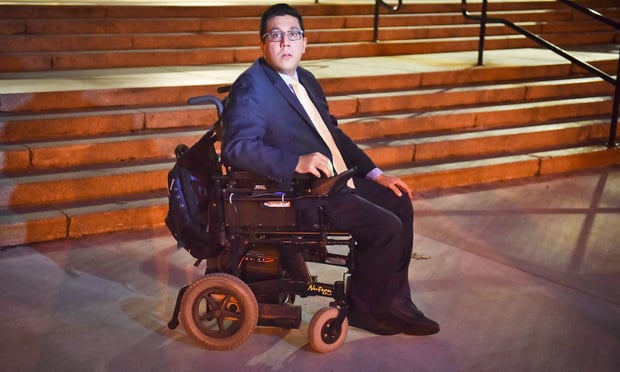Lawyer's ADA Suit Over Brooklyn Courthouse Access Will Move Forward
The lawsuit, brought pro se in 2017 by attorney Caner Demirayak, has survived the state's motion to dismiss, according to a docket entry made Wednesday by U.S. District Judge William Kuntz II of the the Eastern District of New York.
January 28, 2019 at 01:00 PM
6 minute read
 Caner Demirayak.
Caner Demirayak.A federal ADA lawsuit levied by a lawyer who uses a wheelchair that seeks to force the city and state to make significant structural and other changes to the Kings County Supreme Court civil courthouse will move forward.
The lawsuit, brought pro se in 2017 by attorney Caner Demirayak, has survived the state's motion to dismiss, according to both the lawyer himself and a docket entry made Wednesday by U.S. District Judge William Kuntz II of the the Eastern District of New York, who is presiding over the lawsuit.
Kuntz has not issued a written decision denying the state's motion. It is unclear whether a written opinion will be forthcoming.
Meanwhile, New York City and related city defendants have not moved to dismiss the lawsuit, which seeks injunctive relief that would force structural changes to portions of the massive courthouse as well as money damages, including an initial demand of at least $1 million in compensatory damages.
The lawsuit is considered by some attorneys who specialize in Americans with Disabilities Act and related legal claims to have some unique aspects.
Many ADA-based lawsuits that focus on courthouse access have featured, as plaintiffs, people brought into courtrooms temporarily, such as disabled criminal defendants, civil litigants or jurors. They're often there for particular cases held in one designated area. States and other localities operating the courthouses have argued that temporary fixes, such as moving a trial from one courtroom to a more accessible courtroom, were appropriate accommodations. In other words, they've maintained that a one-off fix, or limited fixes, were enough.
In Demirayak's lawsuit, the 30-year-old lawyer, who uses the courthouse at 360 Adams St. often, sometimes three times a week, describes numerous incidents, spanning more than a year, that he alleges have happened in various parts of the 10-story courthouse. He argues in a 20-page amended complaint lodged in December 2017 that he is suffering harm of a “continuing nature” as “each and every time plaintiff performs attorney work in the courthouse, he is injured again and again.”
One key to Demirayak's suit may be whether a judge or jury decides that some of the individual accommodations made for him, such as court administrators or judges switching a hearing, trial or conference to an area of the courthouse he could better negotiate, reached far enough in protecting him such that the accommodations blunted his claims that his career and livelihood are continuously being damaged and that he does not have equal courthouse access.
“They [New York City and state] may try to say they've provided him with reasonable accommodations when he has requested them and when they've been necessary,” said Michelle Caiola, the director of litigation for Disability Rights Advocates, a national civil rights group, who reviewed and commented on Demirayak's amended complaint shortly after it was filed. “It will be a matter of showing that is not going far enough to create equal access,” she said.
“This isn't a one-off situation for him,” Caiola added, “where the court system can accommodate him on a one-off basis. For him to have full and equal access to the courts, they're going to have to remove a lot of barriers.”
Demirayak, who handles personal injury cases for James G. Bilello & Associates, a 50-lawyer firm in Hicksville, has aggressively pushed his lawsuit, and he said on Friday that he is pleased by Kuntz's denial of the state's motion and is looking forward to hopefully presenting the case to a jury.
He also recounted certain comments made by Kuntz last Wednesday, when the parties to his lawsuit aimed at the Adams Street courthouse were in court for a premotion conference pertaining to a different, though similar, suit lodged against the city and state over other courthouses.
According to Demirayak, Kuntz, from the bench, asked the parties whether any of them disagreed that all courthouses should be wheelchair accessible under federal and state law. Lawyers on hand from the state Attorney General's Office did not respond to the question, Demirayak said.
Kuntz also asked in court about a situation in which a lawyer in a wheelchair is assigned to a judge in a courtroom in which the wheelchair cannot fit through a doorway, Demirayak recounted.
A request for comment made on Friday with the AG's Office, in regard to both the denial of the dismissal motion and comments reportedly made by Kuntz in court, was not returned.
Demirayak's suit names numerous defendants, he has said, because of the unique oversight nature connected to the city's more than 30 courthouses. The buildings are owned and maintained by the city's Department of Citywide Administrative Services. But the legal services provided within the facilities are under the aegis of the state's Office of Court Administration.
Demirayak has named as defendants in his lawsuit the city, the state, DCAS, OCA, the city Department of Buildings, and various officers from the agencies.
He has brought claims under the ADA, the Rehabilitation Act of 1973, the U.S. Constitution's equal protection clause, the state's Human Rights Law and the city's Human Rights Law. (Early last year, though, Demirayak dropped the two Human Rights Law claims against the state. The claims remain part of his case against the city, however.)
In motion to dismiss papers filed last April, the AG's Office made numerous arguments seeking to dismiss itself from the lawsuit. A number of them focused on the defendants named.
The state argued, for instance, that it should be dismissed because the state-related defendants are duplicative of OCA, writing that “the State and OCA occupy the same position in defending lawsuits, pay money judgments from the same coffers, and perform injunctive relief through OCA.”
In addition, the state argued that sovereign immunity bars Rehabilitation Act and equal protection claims made by Demirayak. For example, it argued that “Equal Protection claims [should be dismissed] because Congress has not abrogated, nor has the State waived, sovereign immunity with respect to Equal Protection Clause claims.”
In addition, the state contended that the complaint “must be dismissed as against State Defendants because it does not contain any factual allegations describing State Defendants' alleged conduct or the grounds on which Plaintiff's claims rest with respect to State Defendants.” Moreover, the state argued that Demirayak “has failed to state claims under the Rehabilitation Act or ADA because buildings built before the enactment of those statues need not comply with federal architectural accessibility standards so long as a public entity's programs, services, and activities are readily accessible to individuals with disabilities through other means.”
OCA declined to comment on Friday, saying in an email only that “as this remains a pending matter, it would be inappropriate to further comment on any aspect of the case.”
This content has been archived. It is available through our partners, LexisNexis® and Bloomberg Law.
To view this content, please continue to their sites.
Not a Lexis Subscriber?
Subscribe Now
Not a Bloomberg Law Subscriber?
Subscribe Now
NOT FOR REPRINT
© 2025 ALM Global, LLC, All Rights Reserved. Request academic re-use from www.copyright.com. All other uses, submit a request to [email protected]. For more information visit Asset & Logo Licensing.
You Might Like
View All

Courts Beginning to Set Standards for Evidence Relying Upon Artificial Intelligence
4 minute read
NY Judge Admonished Over Contributions to Progressive Political Causes

Attorneys ‘On the ‘Move: Morrison Cohen Expands White Collar Practice; O’Melveny Brings Back Corporate Finance Partner
6 minute readTrending Stories
- 1'It's Not Going to Be Pretty': PayPal, Capital One Face Novel Class Actions Over 'Poaching' Commissions Owed Influencers
- 211th Circuit Rejects Trump's Emergency Request as DOJ Prepares to Release Special Counsel's Final Report
- 3Supreme Court Takes Up Challenge to ACA Task Force
- 4'Tragedy of Unspeakable Proportions:' Could Edison, DWP, Face Lawsuits Over LA Wildfires?
- 5Meta Pulls Plug on DEI Programs
Who Got The Work
Michael G. Bongiorno, Andrew Scott Dulberg and Elizabeth E. Driscoll from Wilmer Cutler Pickering Hale and Dorr have stepped in to represent Symbotic Inc., an A.I.-enabled technology platform that focuses on increasing supply chain efficiency, and other defendants in a pending shareholder derivative lawsuit. The case, filed Oct. 2 in Massachusetts District Court by the Brown Law Firm on behalf of Stephen Austen, accuses certain officers and directors of misleading investors in regard to Symbotic's potential for margin growth by failing to disclose that the company was not equipped to timely deploy its systems or manage expenses through project delays. The case, assigned to U.S. District Judge Nathaniel M. Gorton, is 1:24-cv-12522, Austen v. Cohen et al.
Who Got The Work
Edmund Polubinski and Marie Killmond of Davis Polk & Wardwell have entered appearances for data platform software development company MongoDB and other defendants in a pending shareholder derivative lawsuit. The action, filed Oct. 7 in New York Southern District Court by the Brown Law Firm, accuses the company's directors and/or officers of falsely expressing confidence in the company’s restructuring of its sales incentive plan and downplaying the severity of decreases in its upfront commitments. The case is 1:24-cv-07594, Roy v. Ittycheria et al.
Who Got The Work
Amy O. Bruchs and Kurt F. Ellison of Michael Best & Friedrich have entered appearances for Epic Systems Corp. in a pending employment discrimination lawsuit. The suit was filed Sept. 7 in Wisconsin Western District Court by Levine Eisberner LLC and Siri & Glimstad on behalf of a project manager who claims that he was wrongfully terminated after applying for a religious exemption to the defendant's COVID-19 vaccine mandate. The case, assigned to U.S. Magistrate Judge Anita Marie Boor, is 3:24-cv-00630, Secker, Nathan v. Epic Systems Corporation.
Who Got The Work
David X. Sullivan, Thomas J. Finn and Gregory A. Hall from McCarter & English have entered appearances for Sunrun Installation Services in a pending civil rights lawsuit. The complaint was filed Sept. 4 in Connecticut District Court by attorney Robert M. Berke on behalf of former employee George Edward Steins, who was arrested and charged with employing an unregistered home improvement salesperson. The complaint alleges that had Sunrun informed the Connecticut Department of Consumer Protection that the plaintiff's employment had ended in 2017 and that he no longer held Sunrun's home improvement contractor license, he would not have been hit with charges, which were dismissed in May 2024. The case, assigned to U.S. District Judge Jeffrey A. Meyer, is 3:24-cv-01423, Steins v. Sunrun, Inc. et al.
Who Got The Work
Greenberg Traurig shareholder Joshua L. Raskin has entered an appearance for boohoo.com UK Ltd. in a pending patent infringement lawsuit. The suit, filed Sept. 3 in Texas Eastern District Court by Rozier Hardt McDonough on behalf of Alto Dynamics, asserts five patents related to an online shopping platform. The case, assigned to U.S. District Judge Rodney Gilstrap, is 2:24-cv-00719, Alto Dynamics, LLC v. boohoo.com UK Limited.
Featured Firms
Law Offices of Gary Martin Hays & Associates, P.C.
(470) 294-1674
Law Offices of Mark E. Salomone
(857) 444-6468
Smith & Hassler
(713) 739-1250






